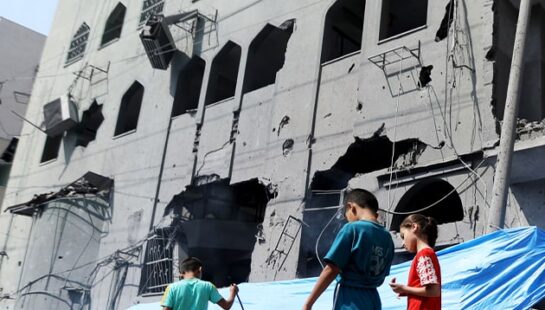One of my late, wise teachers once shared this life lesson: amongst any gathering of people, if we were to see the details of their lives, we would bear witness to ‘suffering enough to freeze the blood.’
As a ministry student at the time, I found the reflection somewhat macabre. Fifteen years later, it’s a line that often comes to mind, ringing outrageously, frequently true whenever another human being extends enough trust to share their story. Life, it would seem, is often difficult.
I think there’s a certain type of pain in life that, while unique in its expression, comes as part of the common human experience. This is not to diminish anyone’s personal experience, or its impact. It is simply to say that most of the pain we experience in life is shared by most humans, to some degree, in some form.
But there’s a different pain; suffering that can only elicit shock—even when it’s only witnessed through the media half a world away, let alone in-situ. A type of pain that simply shouldn’t be.
The Situation In The Middle East
Along with much of the world, shock has been my reaction to the catastrophic pain and suffering currently taking place in Gaza. As it was to the terror unleashed by Hamas in Israel. As it always is to scenes of anguished citizens, left bereft by the death of their children, parents, brothers, and sisters.
Shock is a normal human response to the grief we’re seeing daily in media broadcasts—scenes of crying, screaming, broken souls, whose worlds have been turned upside-down through no fault or act of their own.
To listen is to also hear the demand behind the screams: “Look! Look! Look!”. The land on which the current conflict is taking place, is no stranger to displacement and calamitous destruction. Close to 600BC, ancient Jerusalem was first destroyed by the then Babylonian Empire; it’s fortified wall flattened, it’s buildings and many inhabitants systematically torched, people enslaved and marched away into exile.
Lamenting Is A Biblical Practice
The searing totality of that loss is forever captured in the book of Lamentations. Full of grieving poetry, there is so much in the raw, unfiltered honesty contained in its five chapters that might move us towards feeling we have license to say what we need to God, to even rage should we need to. God is unafraid of hard questions, and not scared of being put on trial. While he does not speak in Lamentations, this doesn’t mean there aren’t words within its poetry that we desperately need to hear.
Or more importantly, words we must learn to pray.
One of the characters in Lamentations is a woman who personifies the destroyed city of Jerusalem. She is also, perhaps, in shock to begin with. She doesn’t even speak until chapter 1 verse 9 but when she does, her first word is worth paying attention to: “Look, Lord, on my affliction.”
She gradually starts to find her voice in verse 11, before turning to others in her grief in verse 12: “Look, Lord, and consider, for I am despised. All you who pass by? Look around and see. Is any suffering like my suffering?”. By verse 20 the emotion is pouring: “See, Lord, how distressed I am! I am in torment…”
Look. Look. Look. This is the demand I hear as I imagine the lament of those weeping daily through our televisions:
“Look. Look, and don’t look away.
Look, because we are human beings too.
Look, because our life or death shouldn’t be dictated by the geography of our residence any more than yours.
Look, because for too long, we have gone unseen.
Look and feel a tiny portion of what we feel.
Look, so that you might imagine yourself as one of us, with your family, here.
Look, be a witness to our humanity and this suffering so that you might become an advocate for peace, because we know that violence only begets violence.
Look. Look, and don’t look away.”
This is the lament I see and hear and hear on the news every day, and I for one cannot look away.
Perhaps if we allow ourselves to be pierced by this demand to look, to identify with the humanity of those suffering, we might be motivated to act, advocate, and give as energetically and generously as we are able, as we hope and pray for peace.
And perhaps if we’ll draw on the courage found in the raw honesty of Lamentations, we might find for ourselves, our families, and our communities, a new depth, texture and authenticity to our own relationship with God.
An Invitation To Lament
Have you ever written your own lament? Could bringing your own confusion, anger, and pain to God be exactly the thing you need? Or maybe the only thing to do right now?
This year, we’d like to invite you to consider also participating in a season of lament as a show of support for all those displaced and affected by armed conflict and violence around the world right now – in Gaza, in Israel, in Myanmar, in Ukraine and elsewhere.
Now if you’re thinking “but I’m no poet”, all you need to know is that a lament doesn’t have any particular poetry conventions. Their defining feature is simply a passionate expression of emotion, as you wrestle with God and reality in grief. To be invited to lament is to be invited to pour out our hearts in honesty, and in so doing, bless others with the grief and questions that this season of life continues to challenge us with.



 Sienna Corkill,
Sienna Corkill,

 Sophia Russell,
Sophia Russell,